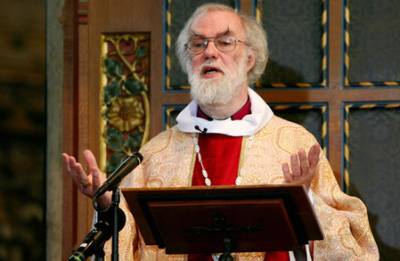Church Didn't Report Bishop's Child Sexual Abuse Crimes Because He Was Gay, Former Archbishop Says

The former Archbishop of Canterbury Rowan Williams suggested this week that the reason the Church of England neglected to take action in a specific sexual misconduct scandal was because the offending bishop, jailed in 2015 for several crimes, was gay.
Williams, who was the Archbishop of Canterbury from 2002 to 2012, told an independent inquiry into child sexual abuse that his colleagues who felt "awkward about the traditional closeted attitude" of the Church of England were likely willing to extend "second chances" when it came to Peter Ball, the Telegraph reported Wednesday.
Ball is a former Anglican bishop of Lewes and of Gloucester, who was sent to prison in October 2015 for misconduct in public office and indecent assault against 18 teenagers and young men over the course of a few decades. He was released last year.
Williams noted that church figures did not desire to be viewed as "judgmental about people's sexual activities" when asked by the lead counsel to the Anglican investigation if attitudes about homosexuality influenced the way Ball was treated.
"[W]e may formally in a disciplinary way disapprove, we may treat them according to the protocols, but we mustn't be seen to be, or we mustn't be judgmental, we must therefore give people second chances and understand the pressures and so on," the former archbishop said.
"So I think there's an element of that coming in, a rather paradoxical consequence of the traditional view of homosexuality within the Church, you want to overcompensate for it."
The inquiry is part of a three-week long hearing on the Anglican Church specifically related to child abuse issues.
Williams also explained how the Church of England has failed to handle sexual abuse cases as an institution, specifically criticizing the "top down model of authority" which leaves "little mental or spiritual space for a victim to speak out in the confidence that they will be heard," according to The Tablet U.K. Thursday.
"So much of this turns on how we understand the exercise of power in the Church, in which we have often been in the past — myself included — naive and uncritical."
"It did take us an unconscionably long time for us to really focus on the need of the complainant and the proper care," he said at the hearing.
The diocese of Chichester has come into particular focus during the inquiry due to abuse issues and cover-ups that took place there in recent years.
When problems in that diocese became broadly known, Williams began considering a formal visitation, and it was alleged that staff at Lambeth Palace, the headquarters of the Church of England, prioritized shielding the reputations of some from bad publicity.
"Emails sent in 2010 between Canon Andrew Nunn, the correspondence secretary, and the Rev. George Pitcher, Lambeth communications director at the time, suggested 'throwing' the then Bishop of Chichester, the Rt. Rev. John Hind, 'to the press as a sacrifice,' in the hope that it would distance Lord Williams from the scandal and prevent the media from suggesting that the CofE's abuse problem was as grave as that of the Roman Catholic Church," Tablet U.K. reported.
Williams maintained he was not aware of those email exchanges and was "shocked" by them.





















